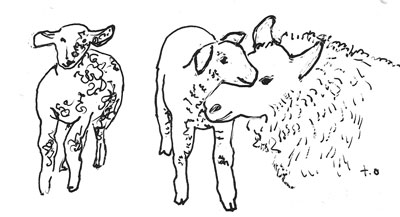 |
| Toki Oshima illustration |
By Diane Schivera, M.A.T.
Important Update on External Use of Zinc Sulfate
The USDA National Organic Program (NOP) recently sent letters of non-compliance to certifiers that allowed external use of zinc sulfate, ZnSO4, to treat hoof infections of sheep, goats and cows. MOFGA Certification Services was one of those certifiers. The NOP permits ZnSO4 as a soil amendment and as a mineral supplement to feed to livestock, so some certifiers interpreted the rule as allowing it for foot treatment. Since the NOP does not list it as allowed, specifically in the section of the rule referring to external use, the NOP states that it is not permitted for use in this way. So any livestock farmer using ZnSO4 externally should stop immediately.
MOFGA is signing on to a petition to allow ZnSO4 for external healthcare treatment. We will keep you posted on the progress of the petition.
Maine Enacts Less Onerous Rules for Poultry Processing Facilities
The Maine Legislature in 2014 voted into law changes for facility requirements for operations processing fewer than 1,000 birds. The specifics for facilities are less onerous. Now you have to show the state inspector, when he or she arrives to inspect your facility, that what you are doing is safe and sanitary – so look carefully at your facility and process. Where are the potential sources of contamination? Fix them! You will be doing your own Hazard Analysis and Critical Control Points (HACCP) evaluation but without all the paperwork.
For fewer than 1,000 birds, you must
• register with the Maine Department of Agriculture, Conservation and Forestry;
• get a Food and Fuel license from the Maine Department of Agriculture, Conservation and Forestry, complete the retail food establishment section of the license, and pay $20 (and, for the meat supplement, $10);
• if selling at farmers’ markets, get a Mobile Vendor License for $20.
All of the above are available from Michele Newbegin at the Maine Department of Agriculture, Conservation and Forestry (207-287-3841).
An inspector will visit periodically after you become registered – and the inspector has the final say regarding what is considered sanitary in any given operation. So pay attention to cleanliness; do a potable water test; use food-grade rather than garden hoses; use sanitizers effectively; and be aware of controlling possible contamination from flies or blowing dust.
Sales may occur on the farm, at farmers’ markets or through CSA (community supported agriculture) enterprises. You may process and sell only birds grown on your farm; birds must be processed and sold by the person who raised them; and they must be processed on the farm where they were raised.
If you raise fewer than 20,000 birds, you qualify for the grower-producer exemption. Facilities must be built, maintained and operated according to Chapter 343: Food Processing and Manufacturing (Maine Department of Agriculture, Conservation and Forestry, Division of Regulations, https://www.maine.gov/sos/cec/rules/01/chaps01.htm). You may process only your own birds and may not share the facility. Sales may occur on the farm, at farmers’ markets or through a CSA; wholesale to hotels, restaurants and institutions; and to retail stores for resale – but only as prepackaged. Birds cannot be sold to a retail store that intends to further process them into cut-ups or some other type of product.
To qualify for a Small Enterprise Exemption (SE), you must raise fewer than 20,000 birds per year. Facilities must be built, maintained and operated according to Chapter 343. The “fewer than 20,000” birds can be live birds purchased from other farmers, purchased inspected carcasses for further cut-up only, and birds you have raised yourself. For marketing, you can repurchase birds and resell the prepackaged birds with the SE processor’s label on the packages. If you buy birds back, you can’t change the label or take the birds out of the package and make cut-ups or other products. The poultry then has to be sold directly to the consumer (through farmers’ markets, a CSA or at the farm) with the proper licenses. A flyer or notice can identify the grower.
